6 Actors Who Thought They Had Made a Totally Different Movie
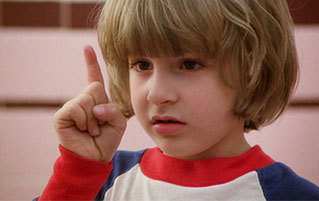
Filmmaking is such a chaotic, haphazard process that it's nearly impossible for the people involved to tell if the movie is going to be good or not. Scenes are filmed out of order, much of what you shoot is going to get cut, and you have to trust that whatever effects fill in the big green wall behind you are going to look good.
So maybe it's not all that surprising that some of the stars of your favorite movies had no goddamned idea what film they were even making. For example ...
Carrie (1976) -- Piper Laurie Thought She Was Filming a Comedy

Carrie is the story of a horribly abused high school outcast with supreme telekinetic power who is finally pushed too far by a prank on prom night and decides to use her mutant ability to kill every single person who ever looked at her askance. To prove she isn't wholly evil, she also kills John Travolta as a public service.

If she had just stopped there, the town would have probably been ready to call it even.
Then Carrie stumbles back home and kills the real villain of the movie -- her mother, a cruelly evil Bible-thumping taskmistress who was Carrie's chief tormenter -- before using her mind-flexes to implode their house.
The Confusion:
Carrie's mother is so over-the-top evil that she's like a kindergartner's drawing of violent religious insanity. In fact, the character was so broad that Piper Laurie, the actress who plays her, was convinced the movie was a comedy when she first read the script. The mother was so operatic to her that she thought the character was intentionally cartoonish.
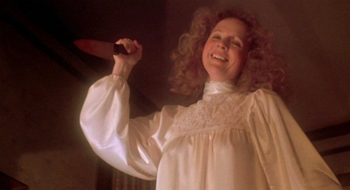
She was surprisingly lax about wire hangers.
Director Brian De Palma had to take her aside and explain that he wasn't exactly going for laughs with his film about abuse, rage, and supernatural murder. Still, Laurie couldn't shake the idea that her character was completely ridiculous, and she laughed constantly between takes. This might have something to do with the scene in which she refers to her daughter's breasts as "dirty pillows," completely stone-faced and without a trace of irony, or it could be related to the Phantom of the Opera cape she wears in every scene with a similar lack of elbow-nudging winks.
Whatever the case, Laurie still insists that Carrie is really a black comedy. We are curious to see what constitutes gut-busting hijinks in her mind, because she's fucking terrifying in that movie.
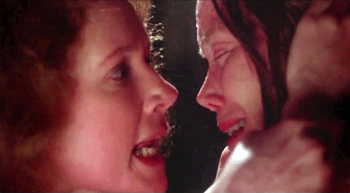
"I'm a horrifying monster! Get it?!"
The Usual Suspects -- Everyone Thought They Were Keyser Soze

The Usual Suspects is a critically acclaimed thriller about a team of career criminals working for a legendary supervillain named Keyser Soze, who we only ever see in a series of flashbacks looking like Antonio Banderas' stunt double with his face shrouded by a delumination spell. The story is told through the eyes of Verbal Kint, the weeniest member of Keyser Soze's gang, as he is being interrogated by a police detective in the wake of their botched ultra-heist.

"I also want to know who the hell keeps stealing my newspaper!"
However, in one of the most infamous non-Shyamalan twist endings in cinema history, we learn that Verbal Kint was really Keyser Soze all along and had made the entire story up to pin the crime on a guy named Dean Keaton, who was conveniently too dead to offer a compelling rebuttal.
The Confusion:
Verbal Kint's story (which, in essence, is the entire movie we just watched) is so convincing that Gabriel Byrne, the actor who played Dean Keaton, really believed he was Keyser Soze. He went right on believing he was Keyser Soze all through the filming of The Usual Suspects and wasn't aware of the twist until he and the rest of the cast were shown a preview screening, at which point he became furiously pissed and dragged director Bryan Singer outside to scream into his face about it. Note: This is not the last time a person would feel compelled to bellow rage gusts at Bryan Singer after watching one of his movies.

"WHY DOESN'T TOM CRUISE EVER SPEAK WITH A GERMAN ACCENT?!"
In fact, according to Kevin Spacey (who played Verbal Kint), Singer had convinced everyone in the main cast that they were Keyser Soze. So Gabriel Byrne, Benicio Del Toro, Stephen Baldwin, and Kevin Pollak all thought they were going to sit in a darkened theater on opening night and watch themselves revealed as the ultimate crime machine. The fact that Singer managed to convince Stephen Baldwin and Kevin Pollak that they were the ultimate anything in his movie is a testament to the strength of his deception.

A full three years passed before Baldwin realized that Singer had paid him in expired Popeye's coupons.
One reason the trickery was so successful was that Singer really believed it was the truth -- he told veteran character actor Pete Postlethwaite (who plays the lawyer Kobayashi in the film) that it didn't matter what part Postlethwaite chose to play, because they were all Keyser Soze. Technically that's true -- the entire movie is just a story made up by Kint/Soze, so every character in it is essentially him -- but that's the same kind of pretentiousness that gave us the most boring Superman movie ever created, so we're kind of with Gabriel Byrne on this one.
The Shining -- The Kid Didn't Know It Was a Horror Movie

Stanley Kubrick's hallucinogenic mindfuck bonanza The Shining stars Jack Nicholson as a man named Jack with a tenuous grip on sobriety (needless to say, it was the acting challenge of his career). He takes his family to a haunted hotel where a bunch of ghosts pause long enough in between giving each other phantasmic costumed blow jobs to convince him to kill his son, Danny, who uses his Professor X thought powers to convince Jack to kill an old black man instead and get locked outside in a fatal snowstorm.
The Confusion:
The little boy who played Danny, 6-year-old Danny Lloyd, had no idea he was acting in a horror movie. Stanley Kubrick, a man famous for not giving one screaming banshee fart for the comfort and safety of his actors, decided to spare Lloyd from seeing all the terrifying bullshit he was capturing on film while making one of the most famous horror movies of all time (this is the same man who, on the exact same film, tormented the lead actress so badly that her hair began to fall out). Evidently he had a soft spot for children.

"And after this scene, you and the twins go to Disney World and play forever and ever and ever."
Lloyd just thought they were making a movie about a family in a hotel. He wasn't even really sure how much he was getting paid to be there. He was only ever shown severely edited footage that took out all the scary parts, which essentially means he thought he was filming the most boring snoozefest ever created, because without the iconic scenes of terror, The Shining is a movie about three people wandering around in cavernous, brooding silence.
Lloyd didn't see the actual uncut movie until many years later as a teenager, and suddenly everything clicked into place -- those two nice British girls with whom he used to play and share lunch in between takes? They were ax-murdered ghosts who wanted his soul. That nice Jack Nicholson man who did a funny tomahawk dance when Lloyd accidentally wandered on set one day? Jack was slobberingly hacking his way through a bathroom door to murder Lloyd's onscreen mother only moments prior.

"I thought we were just filming a new Tonight Show title sequence."
For all his jimmy-legged, scraggly-bearded lunacy, Stanley Kubrick did his absolute best to make sure Lloyd didn't experience any of the psychological horror he was wielding the boy to create. According to historical record, this is the closest to "doing something nice" that Stanley Kubrick ever got.

Ben-Hur -- Charlton Heston Didn't Know His Character Was Gay

Ben-Hur tells the story of Judah Ben-Hur (played by Charlton Heston), a Jewish prince who is betrayed by his childhood friend Messala and forced to endure a life of slavery, and it happily takes the better part of four hours to do so. Ben-Hur keeps almost meeting Jesus in a Forrest Gump sort of way, and in the end restores himself, his family, and his friends by murdering the shit out of Messala in a chariot race.

The Ten Commandments don't apply to anything you do via horses.
The Confusion:
In spite of all its overblown spectacle (including a then-jaw-dropping ocean battle sequence that today looks like Jerry Bruckheimer playing with a bunch of toys in his bathtub), the most common criticism of Ben-Hur is focused on one key point -- Messala's betrayal seems to make absolutely no sense. These guys are supposed to be lifelong friends, and yet Messala rolls on Ben-Hur almost instantly after Ben-Hur refuses (politely but firmly) to help him find dissenting Jews now that Messala is a newly minted stickman of the Roman Empire. Why would Ben-Hur's best friend for life take away his home and family and toss him into anonymous slavery just because he refused to help Messala track down some rabble-rousers that the Romans would've eventually found on their own anyway?
Because Ben-Hur and Messala are actually former lovers, a subtext that was deliberately written into the film and just as deliberately hidden from Charlton Heston.

Pictured: subtext.
According to screenwriter Gore Vidal, he and the other writers were trying to think of a way to have Messala's betrayal make more sense when they came up with the "unrequited love" angle, suggesting that the reason Messala turns so instantly vicious toward his old friend is because Ben-Hur's rejection applies not only to advancing Messala's new career, but also to rekindling their previous relationship.
The director was hesitant (putting a homosexual love affair into a movie about Jesus is something no studio would do now, let alone back in the 1950s), but admitted it was a way better story than what they had and told them to go ahead with it. The filmmakers told Stephen Boyd (the actor who plays Messala) about the subplot, but Charlton Heston was kept utterly clueless because the director was convinced he'd "fall apart" if they told him. This is another way of saying that Charlton Heston could not bear the thought of pretending to be gay for a four-hour movie, so nobody told him that he was.
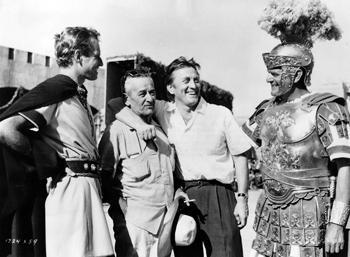
"No, seriously, Romans used to spit-shine each other's dicks all the time."
Boyd isn't exactly downplaying the moony gazes he throws Heston's way, so we assume Heston was simply too busy concentrating on the emotional thrust of his jaw in each scene to notice. Going back and watching the movie now, it seems impossible that Heston could've remained as heroically oblivious as he did. Yet, when he finally found out about the implicit romance years later, Heston emphatically denied that Ben-Hur ever nakedly embraced another man, saying the idea " irritates the hell out of me." Vidal shot back by vehemently backing up his claim and pointing out that Heston was the third choice for the role. Rock Hudson, an actual gay person, was initially offered the role of Ben-Hur, but his agents told him to turn it down because they thought the homosexual undertones could damage his career as a leading man -- the part was literally too gay for a gay man.
Blazing Saddles -- The Singer of the Theme Song Didn't Know the Movie Was a Spoof

Blazing Saddles, the classic Western satire by Mel Brooks, is one of the most popular comedies ever produced. The script (co-written by Brooks and Richard Pryor, among others) balances unflinching portrayals of the irrational stupidity of racism alongside Looney Tunes gags, a man punching a horse in the face, and the most embarrassingly homophobic dance sequence in the history of film. It also contains a scene where a bunch of cowboys fart for a full minute without exchanging a word of dialogue.
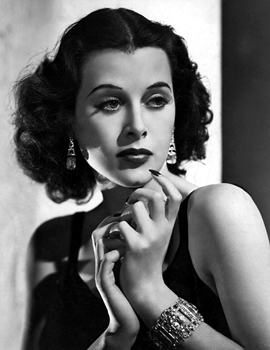
Not all the jokes are quite so timeless, unfortunately.
The Confusion:
Even though Blazing Saddles is a 90-minute clinic in absurdity, Mel Brooks still wanted to make it as close to a traditional Western film as he could. So, he hired Frankie Laine, a singer who had performed countless theme songs to Western movies and TV shows like 3:10 to Yuma and Rawhide, to do the theme for Blazing Saddles, which Brooks himself had written.
The thing was, Frankie Laine had no idea Blazing Saddles was a comedy. Despite the over-the-top goofiness of the lyrics, Laine approached Brooks after he finished recording the song and told him it was so beautiful, it had made him cry. It is unclear whether "He rode a blazing saddle" or "Yes, Bart was his name" was the specific line that brought Laine to tears. This would be roughly the same thing as Dean Martin becoming emotionally overwhelmed after delivering a heartfelt rendition of Weird Al Yankovic's "Fat." But as far as Laine knew, he had just recorded the theme to another powerful dramatic classic like High Noon, and Brooks didn't have the heart to tell him otherwise.

"As long as it's got a white fella riding around shooting bad guys, it's A-OK with me!"
Laine didn't actually see the film until it premiered, at which point he cringed with embarrassment over how emotionally invested he had been in his performance of the theme song, probably somewhere between the third and fourth rape joke.
The Thin Red Line -- Adrien Brody Thought He Was the Main Character

The Thin Red Line was director Terrence Malick's attempt to make Saving Private Ryan as boring as he possibly could. The movie tells the story of various soldiers of C Company during the Guadalcanal Campaign in the Pacific Theater of World War II, with a bloated cast that reads like a list of talking points on an episode of I Love the '90s, including George Clooney, John Travolta, Nick Nolte, John Cusack, Woody Harrelson, and drunken woman-punching machine Sean Penn.
The Confusion:
One name we left off of that list was Adrien Brody, who played Corporal Fife, the central character of the novel on which the film is based. You might assume we didn't mention him because Brody wasn't a huge star at that point, because why else would we leave out the main character? That same question was doubtless at the front of Brody's mind when he finally saw the finished film, because it wasn't until that moment that he discovered he'd been cut almost entirely out.
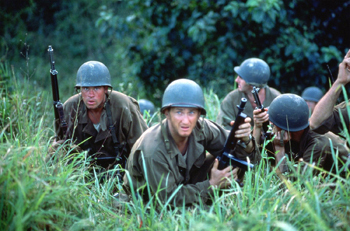
Even from the choreographed dance number that played over the credits.
It's fairly common for an actor's performance to get trimmed down substantially or completely removed, but Brody was the main character. He had filmed his entire role, done press junkets and magazine interviews, and brought his freaking parents to watch the movie's premiere, all with the understanding that he was the central character and that The Thin Red Line was his big break. To call back Saving Private Ryan, this would be like if Steven Spielberg had cut Tom Hanks' role down to three lines and didn't tell him about it until the movie came out.
Brody was understandably heartbroken -- he'd filmed countless hours of material and endured six months of boot camp with Sean Penn and John Travolta, which automatically entitles you to an Academy Award for Special Achievement in Not Killing Yourself (see Carrie, above). Years later, he still considered the experience an exercise in public humiliation, a feeling probably shared by the rest of the people Terrence Malick cut out of the film, including Gary Oldman, Billy Bob Thornton, Martin Sheen, Viggo Mortensen, Bill Pullman, and Mickey Rourke, who, in all fairness, was probably removed because the editors mistook him for a leathery old rhinoceros that had accidentally wandered in front of the camera.
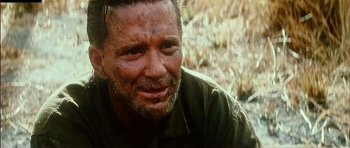
That didn't stop Armond White from praising Rourke's performance as "powerful."
Peter loves his homegirl, Jess, and hopes this shout-out is an acceptable Christmas present. Also, please help launch his buddy's awesome game, Ascendant!
Always on the go but can't get enough of Cracked? We have an Android app and iOS reader for you to pick from so you never miss another article.
Related Reading: Some actors actually weren't acting. Like when Michael J. Fox was nearly hanged in Back to the Future 3. Marty McFly nearly killed the actor playing him. But to be fair, some actors wind up wishing they could kill their iconic roles: such was Sean Connery's hate for James Bond. He still wound up better off than the actors who had these terrible final films.
Why do we love to be scared? There's a reason there are 1,000 SAWs and Paranormal Activities. But now that love is spreading into our newsfeed with increasingly over-embellished headlines terrifying us on a daily basis. Our latest podcast, Jack O'Brien and David Wong sit down to discuss this phenomenon and its unsettling origins. Be sure to download it here and subscribe to it here.